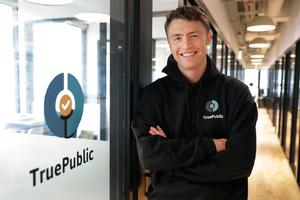Business
Kogod Alum Develops App That Helps Us Understand Each Other—and Ourselves

In September 2018, The New York Times made the surprising decision to publish an op-ed critical of President Trump written by an anonymous member of his administration. The Times justified the author’s anonymity by stating that the senior official’s job would be jeopardized if his or her identity were revealed—a fear that was seemingly validated when the White House called the author “pathetic, reckless, and selfish.” Although the anonymity of the piece in some ways became more of a story than the actual content, it highlighted a question that’s become ever more important in the age of social media—are people more honest when they’re anonymous?
The interplay of anonymity and honesty inspired Kaben Clauson, BSBA ’13, to create an app called TruePublic that allows users to anonymously answer questions ranging from the mundane to the controversial and compare those responses to thousands of others across the United States and, recently, college campuses.
Speaking of his reason for creating TruePublic, Clauson said, “There’s a big piece of what makes us who we are that we don’t express, and there’s a lot of opinions we have that wouldn’t be appropriate to express on social media with our name attached.”
When we spoke with Clauson in 2017, TruePublic had just launched under the name Aop with the goal of exposing the app’s users to different points of view. In 2019, that goal hasn’t changed.
“I have friends on all aspects of the political spectrum like a lot of people, and when I would have honest moments with some of them, they would tell me, ‘I have views about the world that I can't really put anywhere because I don't want to lose friends,’” Clauson said. “On TruePublic people are able to do that.”
With the expansion of TruePublic into college campuses, Clauson hopes to expose what can be insulated communities to dissenting opinions.
“I think a lot of us fall into bubbles,” Clauson said. “I'm friends with a lot of people that went to American University and George Washington [University] and Georgetown [University]. Those are all college-educated people, and the way they view the world is oftentimes very different than people who didn't go to college.”
After answering a question on TruePublic, users can see how their answers compare to others’ according to gender, region, age, race, and political leaning.
One question asks users, “Do you feel there is a gender wage gap?” At American University, 80% of women and 66% of men answered, “Yes, strongly agree.” But in the US as a whole, 31% of women and 18% of men answered the same way.
Clauson acknowledges that these social bubbles form naturally but also believes that getting outside of them is critical. “Giving people the ability to not be identified allows them to express themselves more honestly and with more frequency. And I think a really important thing for society is for people to be really honest with themselves in some way,” Clauson said.
The success of Clauson’s app is dependent upon the honesty of its users, which is why he is so adamant about protecting their privacy. Clauson says, “If we don’t totally protect people, then maybe they’re not going to be honest. We have questions on TruePublic that are very controversial, and if you even for a second thought that your name could be identified, then you will not be as honest. What makes the platform work is that we’re getting people’s raw, raw opinions.”
As Clauson expands the reach of TruePublic, he hopes to add more features, introduce the app into more college campuses, and become a resource for journalists who need accurate polling data. Clauson is hopeful that—with a little honesty—we can better understand each other and ourselves.